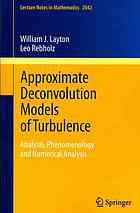

Most ebook files are in PDF format, so you can easily read them using various software such as Foxit Reader or directly on the Google Chrome browser.
Some ebook files are released by publishers in other formats such as .awz, .mobi, .epub, .fb2, etc. You may need to install specific software to read these formats on mobile/PC, such as Calibre.
Please read the tutorial at this link: https://ebookbell.com/faq
We offer FREE conversion to the popular formats you request; however, this may take some time. Therefore, right after payment, please email us, and we will try to provide the service as quickly as possible.
For some exceptional file formats or broken links (if any), please refrain from opening any disputes. Instead, email us first, and we will try to assist within a maximum of 6 hours.
EbookBell Team

4.8
64 reviewsThis volume presents a mathematical development of a recent approach to the modeling and simulation of turbulent flows based on methods for the approximate solution of inverse problems. The resulting Approximate Deconvolution Models or ADMs have some advantages over more commonly used turbulence models – as well as some disadvantages. Our goal in this book is to provide a clear and complete mathematical development of ADMs, while pointing out the difficulties that remain. In order to do so, we present the analytical theory of ADMs, along with its connections, motivations and complements in the phenomenology of and algorithms for ADMs.